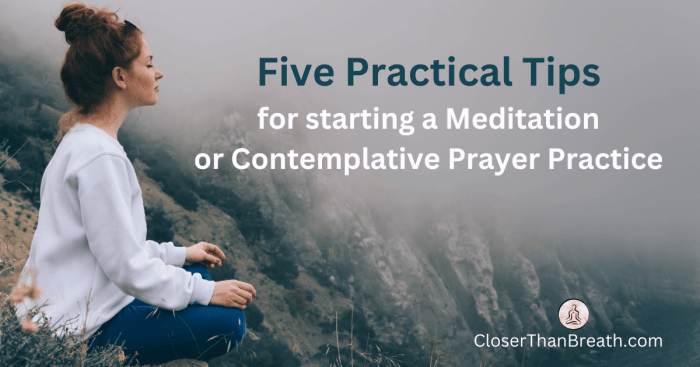7 Tips for Maintaining a Consistent Meditation Practice sets the stage for this enthralling narrative, offering readers a glimpse into a story that is rich in detail and brimming with originality from the outset. In today’s fast-paced world, finding inner peace through meditation is crucial.
Exploring the benefits of a regular meditation routine and practical strategies to overcome common challenges will be key highlights of this insightful guide.
Introduction to Meditation Practice

Embarking on a consistent meditation practice involves dedicating time each day to quiet your mind, focus on your breath, and cultivate mindfulness. It’s about creating a routine that allows you to connect with your inner self and promote overall well-being.
Research has shown that maintaining a regular meditation routine can have numerous benefits for mental health. From reducing stress and anxiety to improving concentration and emotional well-being, the positive impact of meditation is undeniable.
Benefits of a Consistent Meditation Practice
- Reduces stress and anxiety levels
Research has shown that meditation can lower cortisol levels, the hormone associated with stress, leading to a calmer state of mind.
- Improves focus and concentration
By training your mind to stay present and focused during meditation, you can enhance your ability to concentrate on tasks throughout the day.
- Enhances emotional well-being
Meditation can help regulate emotions, leading to greater emotional stability and a more positive outlook on life.
- Promotes better sleep
Regular meditation practice has been linked to improved sleep quality, helping you feel more rested and rejuvenated.
Setting Realistic Goals

Setting realistic goals is crucial when it comes to maintaining a consistent meditation practice. By establishing achievable milestones, you are more likely to stay motivated and committed to your routine. Here are some tips on how to set realistic goals and create a sustainable meditation schedule:
Establishing a Realistic Meditation Schedule, 7 Tips for Maintaining a Consistent Meditation Practice
- Start Small: Begin with just a few minutes of meditation each day and gradually increase the duration as you become more comfortable.
- Consistency is Key: Choose a specific time each day to meditate, whether it’s in the morning, during lunch break, or before bed.
- Be Flexible: Life can be unpredictable, so allow yourself some flexibility in your schedule to accommodate unexpected events.
Personal Experiences with Goal-Setting
“Setting achievable goals helped me stay on track with my meditation practice. By breaking down my objectives into smaller tasks, I felt a sense of accomplishment with each milestone reached, keeping me motivated along the way.”
Creating a Sacred Space: 7 Tips For Maintaining A Consistent Meditation Practice

Creating a sacred space for meditation is like setting the stage for a magical performance. It helps you get into the right mindset and allows you to fully immerse yourself in the practice.
Having a dedicated meditation space is significant because it signals to your mind that it’s time to unwind and focus. It creates a sense of ritual and routine, making it easier to transition into a meditative state.
Designing a Tranquil and Comfortable Meditation Area
- Choose a quiet corner or room in your home where you won’t be disturbed.
- Add elements like cushions, blankets, or a comfortable chair to make your space cozy and inviting.
- Incorporate calming colors like blues, greens, or soft neutrals to create a peaceful ambiance.
- Bring in elements of nature, such as plants or natural light, to connect with the earth and enhance relaxation.
Enhancing the Meditation Experience
A designated meditation space can help you mentally separate from the distractions of daily life and enter a state of mindfulness more easily.
- By creating a sacred space, you are reinforcing the importance of your meditation practice and prioritizing your mental well-being.
- A tranquil and comfortable environment can promote relaxation and reduce stress, allowing you to focus more deeply on your breath and thoughts.
- A dedicated space can also serve as a visual cue to remind you to meditate regularly, helping you establish a consistent practice over time.
Mindful Time Management
In today’s fast-paced world, finding time for meditation can be a challenge. However, with mindful time management techniques, you can prioritize your practice and make it a consistent part of your daily routine.
Time Blocking
- Allocate a specific time each day for meditation and block it off on your calendar.
- Set reminders or alarms to signal the start of your meditation session.
- Avoid scheduling other activities during your designated meditation time.
Prioritizing Meditation Sessions
- Recognize the importance of meditation for your well-being and make it a non-negotiable part of your day.
- Consider meditation as essential as eating or sleeping, and prioritize it accordingly.
- Resist the temptation to put off meditation for less important tasks.
Impact of Consistent Time Management
- Consistently managing your time for meditation helps in forming a habit and making it a natural part of your routine.
- Regular practice leads to improved focus, reduced stress, and increased mindfulness in daily life.
- By prioritizing meditation and sticking to a set schedule, you ensure the sustainability of your practice in the long run.
Overcoming Challenges

When it comes to maintaining a consistent meditation practice, there are often obstacles that can get in the way. However, with the right strategies and mindset, these challenges can be overcome, allowing you to reap the full benefits of meditation.
Identifying Common Obstacles
- Busy Schedule: Finding time to meditate can be difficult when you have a packed schedule. Look for small pockets of time throughout your day to sneak in a quick meditation session.
- Restlessness: It’s common to feel restless or easily distracted during meditation. Practice gentle redirection of your focus whenever your mind starts to wander.
- Self-Doubt: Doubting the effectiveness of meditation or your ability to practice regularly can hinder your progress. Remind yourself of the positive impact meditation has on your well-being.
Solutions for Dealing with Distractions
- Focus on Your Breath: Use your breath as an anchor to bring your attention back whenever distractions arise.
- Set Intentions: Before starting your meditation, set clear intentions for your practice to help you stay focused.
- Practice Acceptance: Accept that distractions are a natural part of meditation and practice gentle self-compassion when they occur.
Personal Anecdotes
“I used to struggle with finding time to meditate amidst my busy schedule, but once I started incorporating short meditation sessions during my lunch break, I noticed a significant improvement in my focus and overall well-being.” – Sarah
“Whenever self-doubt creeps in during my meditation practice, I remind myself of the profound sense of calm and clarity I experience afterward, which motivates me to continue despite the challenges.” – Alex
Variety in Meditation Techniques
In order to maintain a consistent meditation practice, it is important to explore different meditation styles to keep things fresh and interesting. By incorporating a variety of techniques, you can prevent boredom and maintain motivation in your practice.
Examples of Meditation Practices
- Mindfulness: This technique involves focusing your attention on the present moment without judgment. It helps increase awareness and reduce stress.
- Loving-kindness: This practice involves cultivating feelings of love and compassion towards oneself and others. It can promote emotional well-being and empathy.
- Body Scan: This technique involves mentally scanning your body from head to toe, bringing awareness to each part. It can help release tension and promote relaxation.
By trying out different meditation styles, you can find what resonates with you the most and keep your practice engaging.
Accountability and Support
Maintaining a consistent meditation practice can be challenging, which is why having accountability partners or being part of a meditation group can make a significant difference in staying on track. When you know that others are relying on you to show up and meditate, you are more likely to stay committed to your practice.
The Role of Accountability Partners
- Accountability partners can help keep you motivated and accountable by checking in on your progress regularly.
- Sharing your meditation goals with someone else creates a sense of responsibility to follow through.
- Accountability partners can provide encouragement and support when you face challenges or obstacles in your practice.
Tips for Staying Motivated through Community Support
- Join a meditation group or online community to connect with like-minded individuals who share your passion for meditation.
- Participate in group meditation sessions to experience the collective energy and motivation that comes from meditating together.
- Engage in discussions with other meditators to gain insights, tips, and encouragement to enhance your practice.
Impact of Sharing Experiences with Like-Minded Individuals
- Sharing your meditation experiences with others can deepen your understanding and appreciation of the practice.
- Hearing about the progress and challenges of fellow meditators can provide valuable perspective and inspiration for your own journey.
- Building a supportive community of meditators can create a sense of belonging and camaraderie that fuels your commitment to meditation.
Ending Remarks

In conclusion, 7 Tips for Maintaining a Consistent Meditation Practice provides valuable insights and actionable advice for individuals seeking to enhance their mental well-being through meditation. By incorporating these tips into your daily routine, you can cultivate a lasting practice that brings peace and clarity to your life.